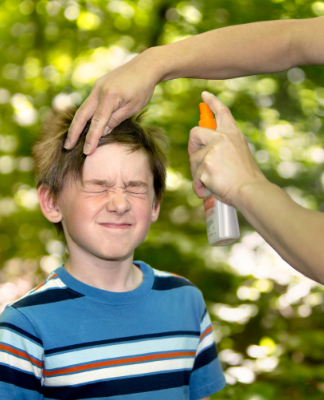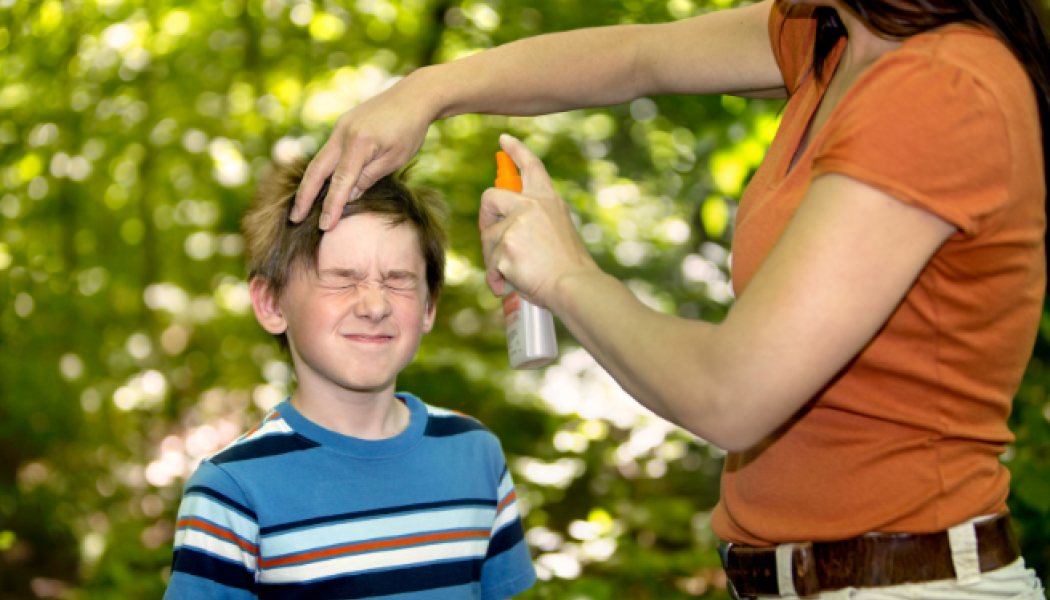People receive a lot of UV exposure and attention from mosquitoes during the summer. Sunscreen and bug repellent serve as effective layers of protection but it’s important to ensure you’re using them properly to maximize that protection. This post contains helpful tips from HealthLink BC.
Choose the right sunscreen & how to apply
Sunscreens come in lotions, gels, ointments, and sprays.
Which sunscreen to choose
- Choose a sunscreen that has a sun protection factor (SPF) of 30 or higher
- Make sure the label says “broad-spectrum” – meaning it protects the skin from ultraviolet A and B rays
- Use lip balm that has SPF of 30 or higher to protect your lips
How to apply sunscreen
- Apply the sunscreen at least 15 to 30 minutes before going in the sun
- Apply sunscreen to all the skin that will be exposed to the sun, including the nose, ears, neck, scalp, and lips. Sunscreen needs to be applied evenly over the skin and in the amount recommended on the label. Most sunscreens are not completely effective because they are not applied correctly. It usually takes about 30 mL (1 fl oz) to cover an adult's body.
- Apply sunscreen every two to three hours while in the sun and after swimming or sweating a lot. The SPF value decreases if a person sweats heavily or is in water, because water on the skin reduces the amount of protection the sunscreen provides.
Bug repellent guidelines & tips
Insect repellent is a spray or liquid that helps keep mosquitoes (and other biting insects) from landing on and biting your skin. DEET is a common active ingredient in many insect repellents. DEET is very safe when used according to the directions on the label.
Guidelines for using DEET safely
- Infants less than six months: Do not use insect repellents that contain DEET.
- Children six months to two years: If they live or travel in areas with high risk of complications from mosquito-borne illnesses, one application per day of repellent containing 10 per cent or less of DEET can be considered. Use sparingly and do not apply to the face or hands.
- Children two to 12 years: Use repellent with 10 per cent or less DEET. Do not apply more than three times/day and do not apply to the face or hands.
- Children over 12 years and adults: Use insect repellent containing 30 per cent or less DEET.
Tips for applying insect repellents
- Use products with a Health Canada Pest Control Product (PCP) registration number
- Choose a repellent that provides protection for the number of hours you will be outside
- Never use a product labelled ‘insecticide’ on your body
- Avoid breathing in spray or mist and never apply inside a tent
- When using sunscreen, apply the repellent 15-30 minutes after the sunscreen.
- Apply the repellent on exposed skin or on top of clothing – not under clothing.
Read more in our Summer Safety series


We’re honoured to announce that IH has been recognized as one of BC’s Top Employers, a distinction that celebrates organizations across the province.
/stories/interior-health-recognized-one-bcs-top-employers-2026


Tanis loves bringing people together in meaningful ways. She helps others use their skills, time and compassion to make a positive difference.
/stories/we-are-ih-volunteer-coordinator-builds-relationships-community


At IH, there’s an opportunity for medical staff to advance their careers through the NAVIG8 Emerging Medical Leaders Program.
/stories/how-interior-health-building-community-medical-leaders


Health Sciences Academy is a unique program that gives students an up-close look at health-care careers and an opportunity to learn from professionals.
/stories/kamloops-student-health-care-program-celebrates-milestone


In the early years of life, particularly from birth to five years old, a child’s social and emotional development is just as vital as their physical growth.
/stories/feelings-first-program-helps-parents-raise-healthy-children


Sarah has dedicated most of her nursing career to serving families within the area, building relationships rooted in trust, humility, and deep respect.
/stories/we-are-ih-celebrating-full-circle-journey-health-care
STAY CONNECTED
Receive news, alerts, public service announcements and articles right to your inbox.



